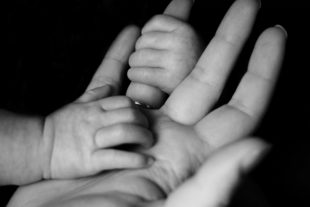Handling the Heartbreak After Miscarriage
Christian Counselor Spokane
The day seemed like any other day. I was doing my internship at a hospital in Lexington, Kentucky. It was a sunny day and I was in a good mood. This was good, considering what was on my mind. I was in my last semester of my senior year of graduate school, held one job, a full-time internship at the VA Hospital, a full load at school, and was married.
I had been to my doctor a few weeks prior to check my thyroid. The doctor checked levels and determined that I needed medication. Okay, no biggie, right? Wrong. She then sent me to an endocrinologist who determined I had cysts in my thyroid.
I had an ultrasound, which then led my endocrinologist to believe I possibly had cancer and would require a test with radioactive iodine. Since this could harm a pregnant woman, I was to have a routine pregnancy test to make sure I was not pregnant before the testing.
 I went to my GP and had the blood test. She called me later the next day and told me I was pregnant. After the first shock wore off, I was excited. Scared and a little overwhelmed, but excited.
I went to my GP and had the blood test. She called me later the next day and told me I was pregnant. After the first shock wore off, I was excited. Scared and a little overwhelmed, but excited.
Then I remembered why I had the test to begin with. If I was pregnant, then I could not have the radioactive iodine test. Fear set in. I then went to the endocrinologist for her to give me the next step.
My husband and I had said unbeknownst of one another in private settings, that we wanted six kids. I had always wanted to be a mother. One of the qualities of why I married my husband was the fact I knew he would be a great father, and he wanted to be a father more than anything. No problems, right?
I figured, well, at least I have graduation to look forward to, and a baby would be a great blessing. So, even though there was a fear of the word, “Cancer,” there was a joy in knowing that I could see my husband being that father, and I would trust in God to heal me and keep the baby safe. All good, right. Fade to next scene.
At my endocrinologist’s office, she gave me all the possibilities. If I was pregnant, I may not carry the baby. If I carried the baby, then the cancer would grow, and I could put myself at risk for possible death. I could have the cancer spread and then I could increase my chances of death as well as the child’s. I lose the baby, but then could have the radioactive test and if it was cancerous, then they would start immediate treatment. Or, it was not cancer.
Not a lot of good options. The doctor then said I would need to take blood tests for the first trimester to determine if my thyroid levels were normal and the pregnancy was viable. I went in to my GP and got my blood drawn. She said to come in the next day and she would let me know about how my pregnancy was doing. I said great and looked forward to my visit.
Now we are back to where my story began. I was driving from Lexington and was running late. I stopped at a phone booth (yeah, I am old, no cell phones), and called my doctor. She said she would stay until I got there. The fear set in. Why would she stay until I got there? Why couldn’t she just tell me over the phone?
I called my husband, who said he would meet me there. I drove up and my doctor was in the doorway. We walked in and she had a grave look on her face. My stomach sank. She said that after the last two blood tests, the pregnancy hormone levels in the blood had dropped in half.
I was losing the baby.
I would need to come in and retest my blood again to make sure the I would not need a D & C. Now the crush came. I was losing my baby, and I might have cancer. I left the office and fell into my husband’s arms. I did not know how to deal with this, and neither did anyone around me.
 Many people over the following days said things that, should we just say, were awfully wrong. I went on to have another miscarriage after my fourth child. Even then, people did not know how to comfort me nor my husband, even those in counseling and pastoral professions.
Many people over the following days said things that, should we just say, were awfully wrong. I went on to have another miscarriage after my fourth child. Even then, people did not know how to comfort me nor my husband, even those in counseling and pastoral professions.
Maybe you have a story like mine. I think that it is one of the grief issues that most professionals, counselors, and friends of those who have miscarried do not know how to help. Miscarriage is a strange, hard loss.
Miscarriage is a strange, hard loss. Share on XMany people do not know what to say because it is about a concept that has been minimized, silenced, and has been educated that it is “just part of life, of nature, and it is nature’s way of selecting the strong and fittest.” But for those left with the sorrowfulness of the loss, often there are not many who can console them or help them with any answers outside of the medical field, and even they don’t always have reasons why.
How to Heal After Miscarriage
So how does one proceed after miscarriage? First off, take the time to mourn. If you’re not ready to tell anyone yet, don’t. And know that you are right in feeling a loss and so deserve to mourn as if someone has died, because he or she did.
Understanding Grief
Here are some ways to understand your grief. For some of you, you didn’t take the time to stop and that can be even more precarious waters to face. You might find that you try many things to try to fill your life. You may even fill it with living children if you have them after miscarriage.
Unresolved grief festers, and at some point, you will find yourself in deep emotional, mental, physical, and spiritual trouble. Healing from a miscarriage does not have to take the person you are.
Grieving for your lost baby can lead into a new growth experience with God, yourself, your spouse, and those around you. You can get through the pain, not around it, and come out a stronger, wiser you.
Shock can have many faces. It is disbelief that ranges from “Oh, no this can’t happen to us and our baby,” to “The doctors are wrong,” to numbness. Whatever it is, God has given our brains this ability to have shock because we are not able to deal with the overwhelming feelings and loss.
As in my case, with my second miscarriage, I was placed on bed rest, so I went into the shock of disbelief and begging with God, even bargaining with Him, that if He would save my baby, I would do “x-y-z” for Him. Our shock wanes as we are able to deal with the feelings, and this is when we need to seek a counselor, talk with trusted friends, and pray to God.
Physical Symptoms After Miscarriage
Next, you may have physical symptoms after miscarriage. As with any pregnancy, hormones are involved. So on top of grief, you may feel hormonal imbalances which can be marked by moodiness, tiredness, irritability, fatigue, etc.
You may lose your appetite, feel nauseous, shake, or have other digestive problems. You can have heart palpitations, frequent swallowing, or feel like you have chest or heart pain.
Emotional Effects of Miscarriage
Anger is the next emotional stage. We may find ourselves angry at ourselves, or angry with our spouse for not knowing how to comfort us or because they didn’t have to go through the physical pain.
We may be mad at well-meaning friends or family who say things like, “It was for the best,” or “There was something wrong with the baby, and you don’t have to worry about raising a child with disabilities,” or “God needed another angel.”
You may be mad at the doctors who couldn’t save the baby, the people in your life who didn’t want a baby and are pregnant, or those who are currently pregnant with healthy babies.
Most of all, you may be mad at God. As Christians, I have found many of us are taught to not be mad at God. But over and over in the Scriptures we find great people used of God who got angry with Him.
 Sara Wheeler and Rana Limbo found in a study conducted at Lacrosse Lutheran Hospital that women who miscarried increased in anger from their miscarriage until their due date. “Sociologists at Clemson University found that mothers whose babies died after birth experienced anger and bitterness, while mothers who experienced miscarriage or stillbirth predominately felt guilt” (Nancy Rue, Here’s Life Publishers, San Bernardino, California, 1987).
Sara Wheeler and Rana Limbo found in a study conducted at Lacrosse Lutheran Hospital that women who miscarried increased in anger from their miscarriage until their due date. “Sociologists at Clemson University found that mothers whose babies died after birth experienced anger and bitterness, while mothers who experienced miscarriage or stillbirth predominately felt guilt” (Nancy Rue, Here’s Life Publishers, San Bernardino, California, 1987).
Fear is another overwhelming feeling which can overtake a person after miscarriage. Fear of becoming pregnant again, fear of telling people and what they will say, fear of the feelings and sadness you feel. Whatever the fear is, you can face it with God.
Other things which you may encounter are instability, an inability to be around new mothers, sadness, isolation, and emptiness. The hurdles of being around newborns, putting away maternity clothes, going in for your follow-up and sitting in your OB’s office with pregnant women, listening to women complain about their children, or other people asking you when you are due because your body still looks as if you are pregnant, and hormonal shifts affecting mood, sleep and depression/anxiety symptoms.
What About the Husbands?
The grieving over a miscarriage, especially if it was an early term miscarriage, is met sometimes by men who don’t know how to express feelings, period. Men may have similar feelings as the wife, but how he expresses them is different.
A lot of men I have spoken to have a feeling that it is harder for his wife because it was her body. She felt the baby, she had the strong desire for children. Many men don’t truly bond with a baby until it is born due to feeling that the child was much more a part of the mom physically before it was born.
Some men try to make jokes, don’t know how to handle their own feelings, and may not feel like they can talk to their male friends about their grief. In the case of my first miscarriage, my husband’s reaction was different because to him there was a sense of relief because now I could have my thyroid diagnosed and he may not lose me to cancer.
 He didn’t grieve until sometime later after the danger with me had passed. He did not want to share this with me because he didn’t want to minimize my pain and grief. Men may be concealing their pain because they believe they need to be strong for their wife, other kids in the family, and for friends.
He didn’t grieve until sometime later after the danger with me had passed. He did not want to share this with me because he didn’t want to minimize my pain and grief. Men may be concealing their pain because they believe they need to be strong for their wife, other kids in the family, and for friends.
Many men are making the phone calls, helping with things around the house, and don’t grieve until later when their wife’s body is feeling better. Many men and women deal separately with their grief and resentments from times in their marriage may resurface more strongly and cause them to be critical of one another. Some wives may feel their husband is mad at them or blames them for the miscarriage. Whatever the case, this does not have to occur.
How to Handle Miscarriage within a Marriage
Here are some tips for handling miscarriage in a marriage:
- Tell each other how you feel.
- Seek safe people to talk with. Many people will not understand and may wonder why you’re not “over it.”
- Give each other affection. Ask if they are okay.
- Talk about the baby.
- Don’t be angry at your husband if he begins to enjoy life before you do.
- Let your husband talk about his feelings and allow him to be vulnerable.
- Wives, let him know what you need: a hug, snuggling, time away, a nap, etc.
- Husbands, allow yourself to grieve. You also had dreams and desires for this baby.
- Husbands, you do not have to always be strong for your wife. You also need to be vulnerable.
- Men, don’t feel guilty if you don’t have as strong of emotions as your wife. Everyone grieves differently.
- Men, allow your wife to grieve if she needs to. Try not to get frustrated when she continues after six weeks or so to show depression.
- Get support outside the home such as church, friends, family, or a grief support group.
- Do not decide about whether to try again, have a hysterectomy or vasectomy until your body is doing better and you are able to manage your grief. Especially do not make this decision if you and your husband have not been communicating well. Husbands, do not make this decision without consulting your wives. Pray together and seek what God wants for your family.
- Know that for whatever reason your child died, God is there for you in the midst of your pain. Your child has been received into the loving arms of God and one day you shall be with them in Heaven rejoicing.
Here are some Scriptures that may help:
- Revelation 21:4
- Psalm 147:3
- Matthew 5:1-3
- Psalm 73:26
- John 14:1
- Isaiah 53:4-6
- Matthew 5:4
- 2 Corinthians 1:3-4
- Isaiah 43:2
- 1 Thessalonians 4:13-18
Special Ways to Remember Your Lost Child
Most importantly, there are things you can do to remember and memorialize your lost child. Here are some ideas which may help:
- Name your child. Even if you suffered a miscarriage in the first trimester, it is good to give your child a name.
- Plan a funeral or memorial service for your child and have only friends and family.
- Plant a tree in memory of your child.
- Have a private ceremony where you write and possibly read the letter to your lost child.
- After my first miscarriage, my husband and I went to a chapel at our graduate school. We had prayed asking God to let us know what the sex of the baby was. We both individually sensed that our baby was a male. We named him and had a ceremony in the chapel with one of our professors, where we dedicated his life to God.
- Write a letter of all the things you feel you will miss because of the child’s death. Some people let it go in a balloon, bury it, or burn it.
- If you have other children, tell them about the brother or sister they lost and allow them to grieve as well. If they are older (7-18), they could plant a flower or write a letter themselves.
- Plant a flower in your yard.
- Give a memorial fund in the child’s name.
Symptoms After Miscarriage that May Require Professional Help
Lastly, there are symptoms which you or your spouse may have which indicate seeking professional help.
Here are some of the symptoms:
- Depression which is still present after two months and interferes with daily living.
- Physical symptoms which persist and there is nothing found medically wrong.
- Suicidal thoughts. Call the crisis hotline, 911, or seek an emergency session with a mental health professional as soon as possible. Especially if these suicidal thoughts become more frequent or if you have a plan on how to do it.
- Total self-induced isolation.
- Increase in anxiety to the point of not being able to be in social settings.
- Increased or heavy use of alcohol or drugs.
- Anger and irritability which interferes in work/home setting.
- Fear of being alone.
- Recurring nightmares.
- Insomnia.
- Body aches and pains which are not medically diagnosed.
If you experience one or more of these symptoms, call a professional immediately. Do not hesitate to reach out. Here at Spokane Christian Counseling, we are here to help.
Photos“Bassinet and Teddy Bear Mobile,” Courtesy of freestocks.org, Unsplash.com; CC0 License; “Abandoned Graveyard,” Courtesy of Vidar Nordli-Mathisen, Unsplash.com; CC0 License; “Hand and Baby,” Courtesy of Liv Bruce, Unsplash.com; CC0 License; “Couple,” Courtesy of Almos Bechtold, Unsplash.com; CC0 License





